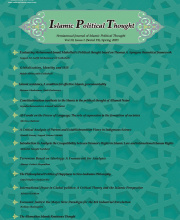
Islamic Political Thought
Islamic Political Thought, Vol.9, Issue.1 (Serial 17), Spring 2022 (مقاله علمی وزارت علوم)
مقالات
حوزه های تخصصی:
Understanding the causes of the backwardness of the Muslim World has been the subject of research in the late three decades. Although much research has been done on this subject, cultural causes have been neglected. This is while culture seems to play an important role in the economic and political development of countries. The cultural crisis is one of the fundamental problems of the Islamic world that has been reflected in most of Imam Khomeini's speeches. The purpose of this study is to investigate Imam Khomeini's view on the cultural challenges of Islamic states using the theory of crisis of Thomas A. Spragens. The findings of this article refer to cultural problems such as westernization, division, self-destruction, emotional-spiritual dependence and crisis of meaning and identity, political and economic instability, the intervention of foreign powers, etc.
The Effect of Normative and Cognitive Ideas on the Foreign Policy (Case study: European Union and the Iran’s Nuclear Program)(مقاله علمی وزارت علوم)
حوزه های تخصصی:
Normative and Cognitive Ideas has a great effect on the Foreign Policy. In fact, today the most international relations theories and models- in contrast to traditional theories such as realism- believe that states decide according to numerous and different factors including normative and cognitive ideas, procedures, meanings, and interpretations of ideas. Normative and cognitive ideas define a situation's interpretation. In this framework, considering the international position of the European Union as a great power and its role in international issues and crises, this article analysis its normative and cognitive Ideas in response to the Iranian nuclear program. This research endeavor to answer the question that what is the role of the normative and cognitive ideas of the European Union in dealing with the Iranian nuclear crisis? The article hypothesizes that the EU's response to crises and intergovernmental convergence over international crises like the Iran nuclear issue is sourced out of a single interpretation by normative and cognitive ideas of EU member states.
Sectarianism, Hybrid War and Rebuilding New CENTO; Finding a Transnational Initiative for Revival of Muslim Ummah(مقاله علمی وزارت علوم)
حوزه های تخصصی:
The Ummah's unity has been shattered by the divide-and-rule machinations of the US through its "Global War on Terror", seemingly rendering the dream of pragmatic geopolitical cooperation between the world's majority-Muslim states a political fantasy. The so-called "Clash of Civilizations" hasn't just been weaponized to provoke inter-civilizational conflicts, but also intra-civilizational ones too, which in the Ummah's case took the form of violent sectarianism. While "conventional knowledge" would suggest that there's no surmounting these obstacles in the near future, Iran might actually be able to pioneer a breakthrough if it revives and reforms the Old Cold War-era CENTO alliance of itself, Pakistan, Turkey, and Iraq in order to symbolically contradict the sectarian trend and enter into mutually beneficial strategic relations with its three most important neighbors.
Theoretical Aspects of Prophetic Justice(مقاله علمی وزارت علوم)
حوزه های تخصصی:
This article mainly undertakes to discuss theoretical aspects in the Noble Prophet's political conduct. In this article, firstly the necessity and importance of political justice has been explained in three parts. Thereafter, we have undertaken to define the essence of justice and to discuss its levels and principles in the Noble Prophet's thought. Equality, as the most important principle of justice in human societies, has also been dealt with. The final discussion focuses on two standards of justice, namely "the syndrome of justice" and "the main criterion of justice". In this discussion political justice from the viewpoint of the Noble Prophet (s) has two principles, three levels, one beginning point and one cardinal standard. The principles of justice are reason and equality, and the levels of justice are the system of being, society and Human being. The beginning point of justice is the epicenter of power at every level of the political system and naturally higher levels have more importance, and the main standard of justice is an indisputable Islamic principle, namely "do unto others what you would like them do unto you". In political justice, "the method of justice" and "the goal of justice" bring society close to the actualization of justice, and avoiding extreme ends is compatible with ease and tranquility, both of which are the ultimate goals of justice, namely Human's felicity and happiness in the world and the Hereafter.
Developments of the Discourse on Justice in the Islamic Republic of Iran(مقاله علمی وزارت علوم)
حوزه های تخصصی:
The Islamic Revolution, which is a breakthrough in the history of Iran, introduced some new concepts in the arena of national debate. Founded on Shi’ite political thought, this Revolution has in recent years followed a particular theory of justice that has its roots in Shi’ite doctrines, and this is evident in the ideas of Imam Khomeini (r) and the current Supreme Leader. While preserving its originality, the Shi’ite concept of justice has been subject to new readings befitting the requirements of each government. In spite of [continued] developments in the discourse on Shi’ite justice under various governments, Shi’ite principles of the concept of justice have nonetheless been kept intact in the system of the Islamic Republic of Iran, and this shows the presence of a complete theory in the field of political thought in the system of the Islamic Republic of Iran.
Imam Husayn’s Arbaeen and the Islamic World Capacities(مقاله علمی وزارت علوم)
حوزه های تخصصی: